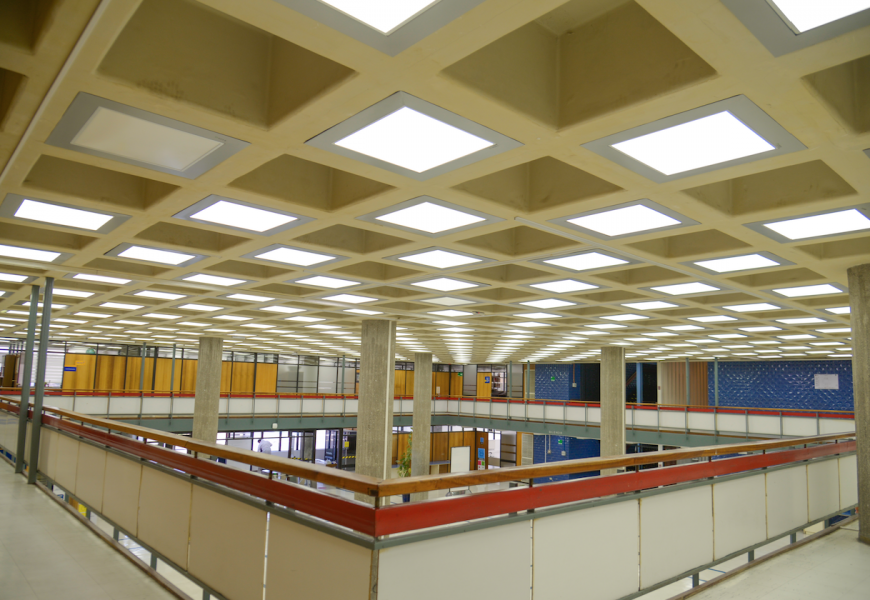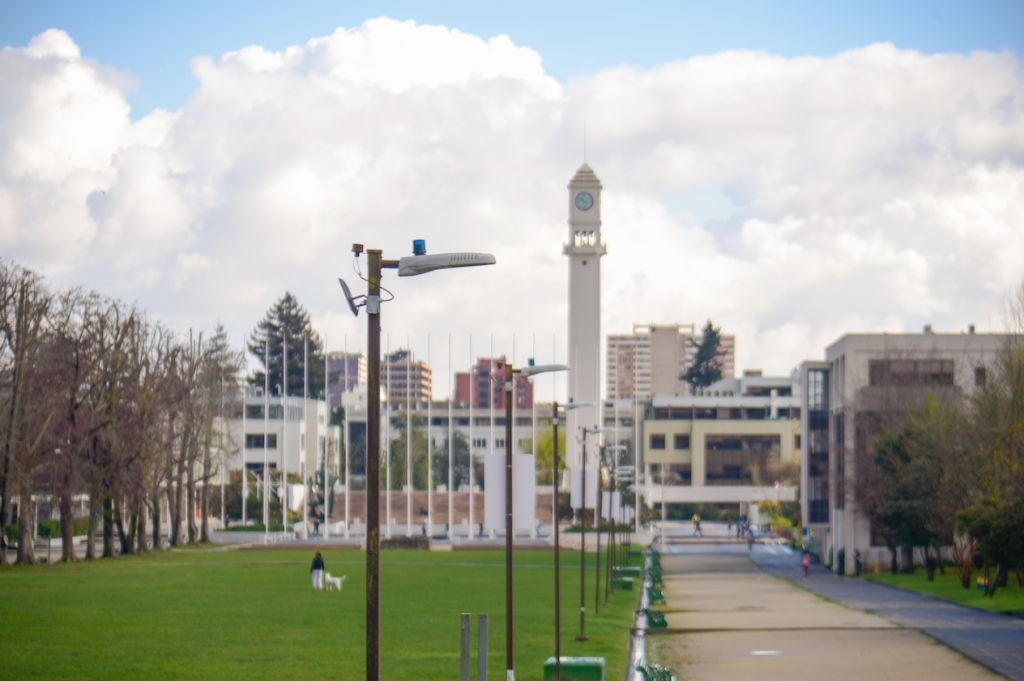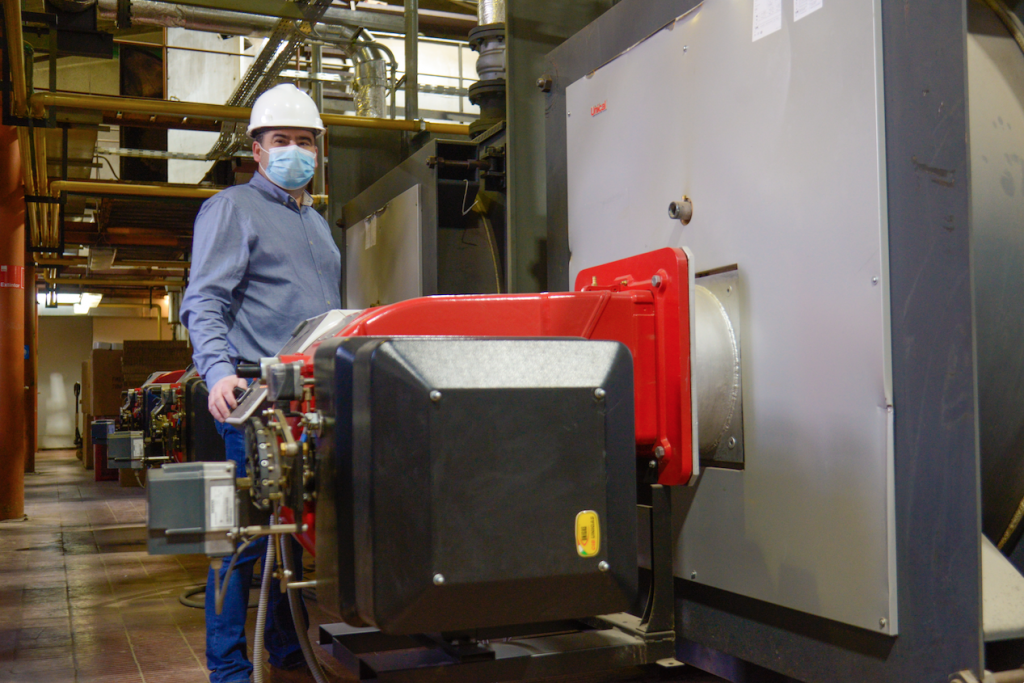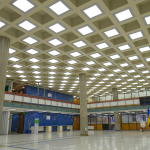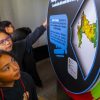In May 2021, the Energy Sustainability Agency awarded the Energy Excellence Seal, in the Silver category, to the Universidad de Concepción for the savings in this area. This action is part of the Program for saving and efficient use of energy that has been developing since the end of 2000 at the University and that includes several initiatives.
By Francis Parra / francisparra@udec.cl / Photographies: Courtesy from Services Direction
Different initiatives have allowed the Universidad de Concepción to add progress in terms of energy efficiency, explained the Director of Services, Alejandro Tudela.
For example, the “Lumen IQ” Public Lighting Control System, centralized and remote, unique in the country’s universities, allows constant monitoring of energy consumption.
Also, the Full Led project, which involved the replacement of the lighting system in the Central Library, the central classrooms and the public lighting of the three campuses which, by replacing 30,000 traditional high-consumption lights, allowed in 2015 a reduction of one 8.6% in the energy index.
Another relevant action is applied to new constructions and renovations, where sustainable construction criteria have been incorporated, such as: Led lighting, efficient heating systems with condensing boilers, thermally isolated networks, radiators with thermostat control, envelopes thermally more efficient and air conditioning systems of variable speed.
Other initiatives under evaluation are the Solar Photovoltaic and Thermal Energy Generation project and the Alternative Fuels for the Thermal Power Plant, responsible for more than 50% of the university’s natural gas consumption.
In the project that involves installing solar panels, Tudela specified the desirable technological innovations must be reconciled with the restrictions imposed, for example, by the preservation of the UdeC’s heritage spaces.
The creation of a Sustainability Unit in the Services Department is also in process. This will strengthen the actions that have been carried out during the last years, develop a Sustainability Policy and a work plan that fulfill the objectives defined in the Institutional Strategic Plan.
Beyond Recognition
Obtaining the Silver Seal for the use of new technologies in boilers was a milestone for the university, said Marcelo Valderrama, head of the Services Department Maintenance: “The improvements added to the central heating network allowed an increase of 20 % of”, he explained; adding that the traditional boilers, which have existed since 1978, have been changing, first for coal-fired boilers, then for gas heaters and now for condensing systems, which is the current technology.
Valderrama appreciates that today all new buildings include thermostatic valves, which have a certain graduation and allow that when the temperature reaches a certain degree, energy is no longer consumed.
This energy efficiency measure is being extended to the oldest departments and a project to incorporate thermostatic valves in the Natural Sciences, Pharmacy and Engineering buildings has already been approved.
Work in progress is also being done on a new water collection system, so that the irrigation system is more efficient, as it works according to the percentage of humidity.
Another action in order to use drinking water properly can be found in ordinary bathrooms that have flux meters, which allow this resource not to be wasted. That means an approximate saving of 30% in drinking water costs.
Clean Energy
The academic Luis García Santander, from the Department of Electrical Engineering, advised the Universidad de Concepción in the process that culminated in 2019, when the UdeC and ENEL (Empresa Nacional de Electricidad – National Electricity Enterprise) signed a 100% clean energy agreement for the 6 contracted jointing with this generator, of the total of 10 that the UdeC currently has.
The contract that was signed with ENEL meant a contribution of 100% renewable energy and savings of approximately 23% of the billing. “A percentage of these savings was used to buy energy measurement equipment and to automate certain processes, which contribute to the institution’s energy savings,” he specified.
In this context, the academic highlights initiatives such as the replacement of 1,240 sodium and mercury lamps for Led luminaires. Of these, 504 have remote management, that is, they can be programmed independently and remotely.
Automated air-conditioning and installation of motion sensors to turn on the lights in corridors and common spaces, also contribute to energy efficiency. “Thus, the energy is consumed when it needs to be used,” he said.
Meanwhile, Marcelo Valderrama, reflected that “in order to move towards a sustainable university, it is necessary to promote an organizational culture where staff, academics and students identify and participate in the promotion of good practices and efficient use of energy.”
For García Santander, the incorporation of the UdeC to the Sustainable Campus Network, in the year 2018, meant a boost in this field of action that has been developing since 2005 and that seeks to transform the institution into a University with a Sustainable Campus.
For more information contact:
francisparra@udec.cl
Last modified: 29 de agosto de 2025
